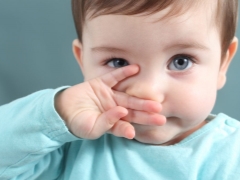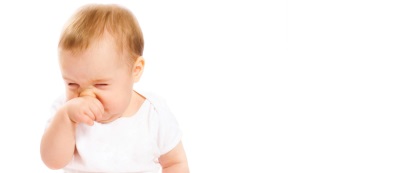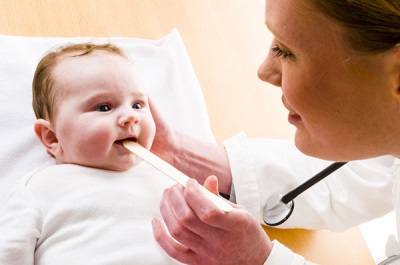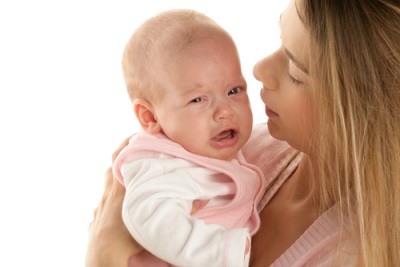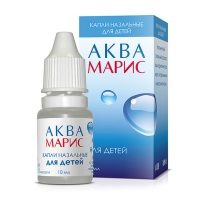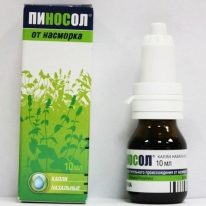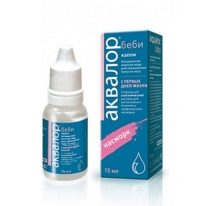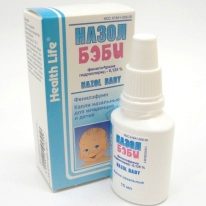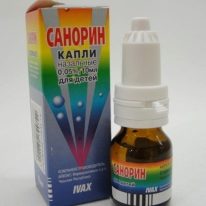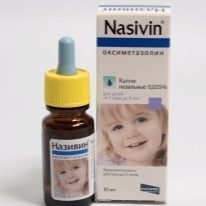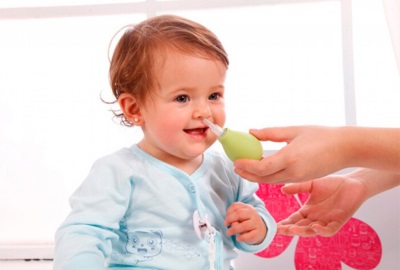Treatment of rhinitis in infants and babies
Any discomforts in nursing babies are alarming to their parents and alarming, even if it is a cold. But, before you panic, you should understand why the newborn and the infant may have such a symptom, is it dangerous at an early age, and how to properly treat it.
What is a runny nose?
A runny nose or, according to medical terminology, Rhinitis is a symptom of various diseases, which is manifested by difficulty breathing through the nose and the appearance of mucous discharge. The kid sniffles with a cold, sneezes and "squishes" the nose. The frequent occurrence of rhinitis in infants is due to narrow nasal passages at an early age, as a result of which the nose is quickly blocked with mucus, even if it is small.
What is it like?
In infancy, a runny nose can be:
- Physiological. The reason for such a runny nose is not well-functioning work of the mucous membrane, which after birth for 8-10 weeks only gets used to the conditions of breathing through the nose.
- Viral. A baby can become infected by a sick child or a virus carrier while walking, in a clinic or in another public place.
- Bacterial. Most often, such a runny nose appears as a complication of a viral disease, when pathogenic bacteria begin to multiply actively in a weakened children's organism.
How to understand, cold is dangerous or not?
The danger of a runny nose for babies of the first year of life is due to the inability of children of this age to breathe through their mouths and to blow themselves out, as well as the rapidity of edema of the nasopharyngeal mucosa, which can cause problems with breathing, eating and sleeping. In addition, a mild runny nose in an infant up to a year can quickly spread to a child’s body, provoking otitis, ethmoiditis, conjunctivitis or bronchitis.
In order to prevent serious complications and a long course of a cold in the infant, consult a doctor in such cases:
- Baby's body temperature above + 37.5 ° C.
- The crumbs appeared dyspnea.
- The baby has a bad appetite, even refusal to eat.
- A runny nose prevents the crumbs from sleeping.
- Symptoms do not go away longer than 7 days.
- A runny nose is caused by contact with a potential allergen.
Effective remedies for treatment
Cleaning spout
Since a child under one year old cannot blow his nose on his own, the main task of parents should be to remove excess mucus from the baby’s nose. For this purpose it is recommended to use special aspirator or small syringewhich has a soft nose. Do not use syringes or cotton swabs to remove mucus.
Doctor Komarovsky will tell in detail the sequence of actions for cleansing the baby’s nose in the video:
Microclimate in the room
If a cold suffers a baby, parents must ensure an optimal microclimate in the nursery. The baby must breathe clean and humid air, and dried air in a too warm room will only worsen the runny nose.
65-75% is considered the norm of humidity for a child's room, and the optimum temperature is called + 28 ° C for a newborn, + 24 ° C for a child aged 1-9 months and about + 22 ° C for a baby older than 9 months.
Any items accumulating dust should be removed from the room and wet cleaning should be carried out regularly. You should also give your baby to drink more, as the discharge from the nose removes fluid from the body of the crumbs.
Medications
To prevent the mucous membrane from drying out in the nose, babies are advised to bury moisturizing products. These include salt solutions - like pharmacies based on sea salt (Aquamaris, No-salt, Aqualore, Salin and others), and cooked at home from boiled water and salt.
Also babies of the first year of life can be buried oil drops, because such tools also help keep the mucous moisturized. The preparations permitted for infants are petrolatum, equalipt and mint oil.
To andswitch off the risk of an allergic reaction; the first use of such drugs should be represented by 1 drop of the product applied to the skin under the tip of the crumbs. If after 3-4 hours the skin does not turn red, and the runny nose does not increase, then you can drip the oil means 1 drop in each nostril. In the absence of negative reactions further single dose can be increased to 2-3 drops.
With significant mucosal edema, the pediatrician may recommend instillation of vasoconstrictor drugs. From the funds of this group in infancy, you can apply Nazol Baby, Otrivin 0.05% and Nazivin 0.01%. Such drugs are often instilled at bedtime no more than once every 6 hours and no longer than three days in a row.
Infants up to one year old can also bury Protargol (an antiseptic preparation containing silver) and Vibrocil (a medicine that has both a vasoconstrictor and an antihistamine effect).
We recommend to watch the release of the program "Without a prescription", dedicated to the treatment of rhinitis in infants
Tips
- If a runny nose appeared in an infant baby, the best tactic of parents should be an appeal to the pediatrician. The doctor will examine the crumb, determine the cause of such a symptom and recommend the correct treatment.
- Do not use in the treatment of rhinitis in an infant folk remediesas nIt is very difficult to guess the reaction of an organism of such a small child to popular recipes. At an early age, instillation of juices, decoctions and herbal infusions is contraindicated.
- Remember that in infancy Do not flush your nose. The procedure is not safe for a small child, because the solution can get into the lungs and the auditory tube. Also do not recommend crumbs steam inhalation. The only allowable manipulation at the age of one year is the instillation of the nose.
- Do not bury breast milk in the baby’s nose, because it will be an excellent nutrient medium for microorganisms. And because such a treatment can provoke the accession of a bacterial infection.
